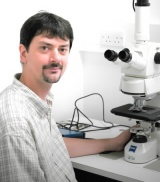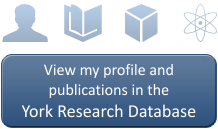Dr Christoph Baumann
Lecturer
Research
A variety of cellular processes, including transcription, replication and recombination, involve simultaneous melting and unwinding of the two DNA strands, and translocation of the strands within a DNA-bound protein complex. In vivo DNA behaves as a closed structure lacking free ends (not unlike a covalently closed circular DNA), thus helix rotation about a free end or fixed ends is not possible. As a consequence, DNA strand separation and translocation results in local regions of over wound and under wound DNA, i.e. positive and negative supercoiling, respectively. I am interested in understanding how these topological changes in DNA are driven by the action of motor proteins, and how the resulting topological changes can directly modulate the function of a motor protein. The enzymes involved in these cellular processes do mechanical work on DNA by harnessing the energy within deoxy- or ribonucleotide triphosphates. They are referred to as molecular machines or molecular motors. I am interested in understanding the molecular mechanism whereby these motor proteins couple biochemical turnover to mechanical work. Using optical tweezers and single-fluorophore detection (total internal reflection fluorescence microscopy), respectively, the mechanical forces generated by these enzymes can be measured at the single-molecule level, while following the biochemical turnover of fluorescently labelled substrates.


